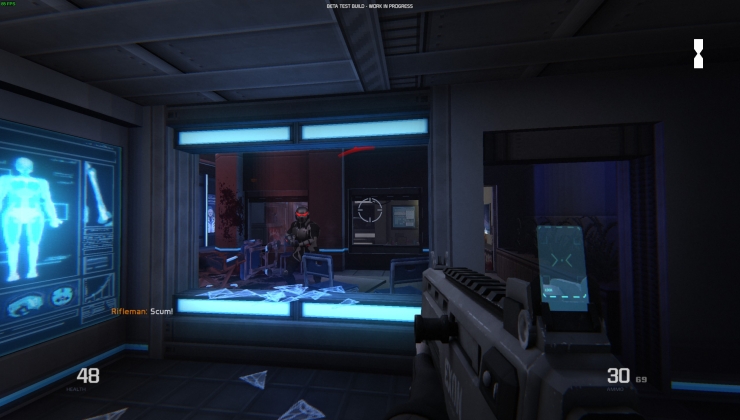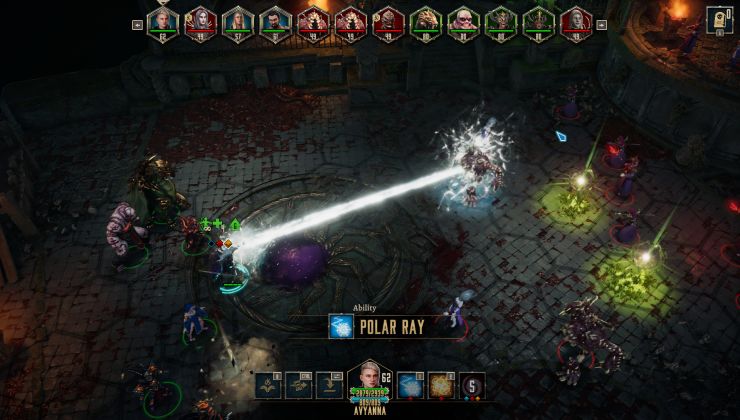As we speculated previously, Valve have now officially announced their new version of 'Steam Play' for Linux gaming using a modified distribution of Wine called Proton, which is available on GitHub.
What does it do? In short: it allows you to play Windows games on Linux, directly through the Steam client as if they were a Linux game.
What many people suspected turned out to be true, DXVK development was actually funded by Valve. They actually employed the DXVK developer since February 2018. On top of that, they also helped to fund: vkd3d (Direct3D 12 implementation based on Vulkan), OpenVR and Steamworks native API bridges, wined3d performance and functionality fixes for Direct3D 9 and Direct3D 11 and more.
The amount of work that has gone into this—it's ridiculous.
Here's what they say it improves:
- Windows games with no Linux version currently available can now be installed and run directly from the Linux Steam client, complete with native Steamworks and OpenVR support.
- DirectX 11 and 12 implementations are now based on Vulkan, resulting in improved game compatibility and reduced performance impact.
- Fullscreen support has been improved: fullscreen games will be seamlessly stretched to the desired display without interfering with the native monitor resolution or requiring the use of a virtual desktop.
- Improved game controller support: games will automatically recognize all controllers supported by Steam. Expect more out-of-the-box controller compatibility than even the original version of the game.
- Performance for multi-threaded games has been greatly improved compared to vanilla Wine.
It currently has a limited set of games that are supported, but even so it's quite an impressive list that they're putting out there. Which includes DOOM, FINAL FANTASY VI, Into The Breach, NieR: Automata, S.T.A.L.K.E.R.: Shadow of Chernobyl, Star Wars: Battlefront 2 and more. They will enable many more titles as progress on it all continues.
To be clear, this is available right now. To get it, you need to be in the Steam Client Beta.
There will be drawbacks, like possible performance issues and games that rely on some DRM might likely never be supported, but even so the amount of possibilities this opens up has literally split my head open with Thor's mighty hammer.
Holy shit. Please excuse the language, but honestly, I'm physically shaking right now I don't quite know how to process this.
Update #1: I spoke to Valve earlier, about how buying Windows games to play with this system counts, they said this:
Hey Liam, the normal algorithm is in effect, so if at the end of the two weeks you have more playtime on Linux, it'll be a Linux sale. Proton counts as Linux.
Quoting: GuestIt's a subtle point that your own post misses: we most definitely would have reached here without Valve.
It's missing because I don't think it's true. I'd argue that we weren't at this point two weeks ago and that we wouldn't be for a long, long time. I have 6k games in my steam library, over half of them only have Windows version (I got them through bundles etc.). Over the last five years I played maybe three or four (sic!) of these games. All the tools were there: wine, crossover (which I bought and only ever used to play gog version of The Witcher), lutris, recently dxvk etc. etc. - but it was immensely impractical and thus for me too much of a bother. Not to mention that I'm mostly gaming on SteamOS with my kids and there was literally no way to play Windows games on SteamOS. Now? For the last week+ I've been playing dozens of Windows games which I've been long wanting to play - nothing spectacular, mostly puzzle games that were reportedly working fine with wine, but required starting a "wined" version of steam. Kids have been playing the LEGO and Sonic games, with controllers, out of the box... *This* is huge. The simple fact that one of the biggest players in the gaming market came, took all the existing tools and put them to a proper use. Yes, all these tools were there and lots of people put great effort into making them work - and for that they deserve full credit. But tools are always only tools, they don't make great things by themselves.
Last edited by pb on 30 August 2018 at 4:58 pm UTC
Quoting: GuestIt's a subtle point that your own post misses: we most definitely would have reached here without Valve.
Possibly, but when? Valve accelerated OpenGL and Vulkan support in Wine a lot (for D3D translation). They also poured a lot of resources into Mesa making features arrive quickly. Sooner is better.
Last edited by Shmerl on 30 August 2018 at 4:58 pm UTC
Quoting: GuestBesides, if proton was only a hedge against Microsoft they would probably announce plans to port it on Mac too.
MacOS is really dead weight for gaming, so no surprise it's not a priority. For Valve to move away from Windows it's not an option.
Quoting: GuestIf GNU/Linux desktop becomes more widespread, then it would be very, very bad if Steam holds dominance on gaming for the same reasons - and actually worse, because a core concept of GNU/Linux is to be open.
Being open has nothing to do with monopoly. You can have one without the other, both or none.
On his part Valve is playing nice on both sides though. It contributes and started open projects and it made literally nothing to wall his garden off (one could argue it even encouraged competition at its own expenses by providing free keys to devs to sell on whatever venue they want even if, ultimately, Valve pays the bills of the Steam infrastructure these key leverage).
In doing that it showed that it sports the exact opposite of Apple core values. Its business model is more similar to what Google did with early Android, create and improve the infrastructure for free to increase the value of the platform in exchange of having its own market on the devices of the final users.
Personally I think too that SteamOs would benefit as a project from having other markets integrated as well. But as long as the competition is to stingy to re invest part of their revenues in the project (or the linux infrastructure in general) it's hard to make this a Valve fault.
Quoting: Purple Library GuyBut the thing is, since Linux is a potential weapon specifically against Windows, it is a weapon effective in direct proportion to how well it stacks up against Windows as a (gaming) platform. Making Windows better as a gaming platform (like by making Proton work on it so Windows users can play old games), therefore, reduces the potency of the weapon. Which isn't to say they absolutely won't do it if they feel they have more to gain than to lose, but that loss is there.I see Valve as mostly a "good guy" when it comes to companies, so I would generally expect them to extend the tool to Windows just because they can and it's good for their users. Even if commercially the only benefit is goodwill. You do bring an excellent point with that last remark, though. Proton on Linux is quite likely to drive sales, whereas on Windows the impact will likely be much less noticeable. Although, I reckon even a much smaller percentage of increased sales on Windows would easily outshine Linux sales in absolute value no matter how much the latter grow. I guess it could go both ways depending on how hard Valve wants to push Linux.
I don't think they'd gain that much, either--most Windows users would just use Proton to play the back catalogue of games they already bought but can't play any more, rather than spending new money.
Quoting: pbQuoting: GuestIt's a subtle point that your own post misses: we most definitely would have reached here without Valve.
It's missing because I don't think it's true. I'd argue that we weren't at this point two weeks ago and that we wouldn't be for a long, long time. I have 6k games in my steam library, over half of them only have Windows version (I got them through bundles etc.). Over the last five years I played maybe three or four (sic!) of these games. All the tools were there: wine, crossover (which I bought and only ever used to play gog version of The Witcher), lutris, recently dxvk etc. etc. - but it was immensely impractical and thus for me too much of a bother. Not to mention that I'm mostly gaming on SteamOS with my kids and there was literally no way to play Windows games on SteamOS. Now? For the last week+ I've been playing dozens of Windows games which I've been long wanting to play - nothing spectacular, mostly puzzle games that were reportedly working fine with wine, but required starting a "wined" version of steam. Kids have been playing the LEGO and Sonic games, with controllers, out of the box... *This* is huge. The simple fact that one of the biggest players in the gaming market came, took all the existing tools and put them to a proper use. Yes, all these tools were there and lots of people put great effort into making them work - and for that they deserve full credit. But tools are always only tools, they don't make great things by themselves.
I don't think this was as far out of reach as you think. Lutris has already made great strides in being a game client that automated installs for WINE based games. Obviously, Lutris can't have as tight an experience as Steam can for Steam games, but it's still quite good. Lutris had already given me that same experience you've just had, where you start playing games you wanted to play, because it's suddenly easy to play them.
Don't get me wrong, I think SteamPlay + Proton is a complete game changer, but I agree with mirv, we'd have got pretty close to the same experience eventually without Valve.
Quoting: GuestIt's a subtle point that your own post misses: we most definitely would have reached here without Valve.
Once I spoke a wise person, former CEO, that told me that every role in a prospering company is as equally important as another role, no matter if it's the technical team, sales and support or the cleaning people. Everybody contributes in their own way and a company as a whole wouldn't work if you leave one out. Same here in my opinion. Sure, the technical groundwork was done by wine, dxvk and other teams, but to _really_ get of the ground you'll also need the people that put the things together, promote* and channel it to the masses, provide support etc etc. Its a combined effort of the development teams, Valve and the Linux community, all ingredients are equally important in the hopefully great success story that proton can be. It won't work if you skip one.
*not just to users but also to developers/publishers since proton games do count as Linux purchases
Last edited by jens on 31 August 2018 at 6:44 am UTC
Quoting: hummer010I don't think this was as far out of reach as you think. Lutris has already made great strides in being a game client that automated installs for WINE based games. Obviously, Lutris can't have as tight an experience as Steam can for Steam games, but it's still quite good. Lutris had already given me that same experience you've just had, where you start playing games you wanted to play, because it's suddenly easy to play them.Having never used the former, how does Lutris differ from PlayOnLinux? Although PoL was supposed to simplify Wine, relying on a small team to prepare and update packages for every program out there still meant that a lot of the time what you were looking for wasn't in the library of preconfs or didn't work anymore. Proton being run by Valve/on Steam has the advantage of more dedicated support and a much larger audience to report issues and suggest fixes; and already it seems to run a lot of games very well out of the box, instead of holding your hand while you jump through hoops but not actually removing the hoops (like PoL).
Don't get me wrong, I think SteamPlay + Proton is a complete game changer, but I agree with mirv, we'd have got pretty close to the same experience eventually without Valve.
Quoting: SalvatosQuoting: hummer010I don't think this was as far out of reach as you think. Lutris has already made great strides in being a game client that automated installs for WINE based games. Obviously, Lutris can't have as tight an experience as Steam can for Steam games, but it's still quite good. Lutris had already given me that same experience you've just had, where you start playing games you wanted to play, because it's suddenly easy to play them.Having never used the former, how does Lutris differ from PlayOnLinux? Although PoL was supposed to simplify Wine, relying on a small team to prepare and update packages for every program out there still meant that a lot of the time what you were looking for wasn't in the library of preconfs or didn't work anymore. Proton being run by Valve/on Steam has the advantage of more dedicated support and a much larger audience to report issues and suggest fixes; and already it seems to run a lot of games very well out of the box, instead of holding your hand while you jump through hoops but not actually removing the hoops (like PoL).
Don't get me wrong, I think SteamPlay + Proton is a complete game changer, but I agree with mirv, we'd have got pretty close to the same experience eventually without Valve.
Similar, but different. Lutris is, at the forefront, a game client. You add games to it, and then you can access all your games, just like the Steam client (I actually prefer the interface of Lutris). Lutris can connect to your Steam account, and automatically import all of your steam games. Supposedly, they are working on doing the same thing with GOG. Lutris, will then manage the installation of the games, whether they are native from Steam, GOG, or otherwise. If it's a Windows game, Lutris will also install WINE. It can also manage games from a whole slew of emulators as well. Once the games are installed, you can run them from Lutris. Ultimately, it's a bit like an open source Steam client, without the backing of the steam library.
Sadly, on the WINE front, it is very similar to PoL, that the install scripts are maintained by a handful of people.
Quoting: SalvatosQuoting: hummer010I don't think this was as far out of reach as you think. Lutris has already made great strides in being a game client that automated installs for WINE based games. Obviously, Lutris can't have as tight an experience as Steam can for Steam games, but it's still quite good. Lutris had already given me that same experience you've just had, where you start playing games you wanted to play, because it's suddenly easy to play them.Having never used the former, how does Lutris differ from PlayOnLinux? Although PoL was supposed to simplify Wine, relying on a small team to prepare and update packages for every program out there still meant that a lot of the time what you were looking for wasn't in the library of preconfs or didn't work anymore. Proton being run by Valve/on Steam has the advantage of more dedicated support and a much larger audience to report issues and suggest fixes; and already it seems to run a lot of games very well out of the box, instead of holding your hand while you jump through hoops but not actually removing the hoops (like PoL).
Don't get me wrong, I think SteamPlay + Proton is a complete game changer, but I agree with mirv, we'd have got pretty close to the same experience eventually without Valve.
Quite my experience too. I've had no success with Lutris for the many games that I tried it (always stuck somewhere during installation and/or download times were aweful). It wasn't much better with PlayonLinux (LotRO kept on crashing even if it works ootb with a vanilla wine-stable). The best solution all-round was to tweak the wineprefix myself, but it's time consuming. Setting up 20+games without any guarantees of success is kind of unpleasant and I have much less time then I used to have for this kind of stuff. SteamPlay is a no-brainer compared to that.
That's just my personal experience, though.
Edit: Typo.
Last edited by Mohandevir on 30 August 2018 at 6:47 pm UTC










See more from me